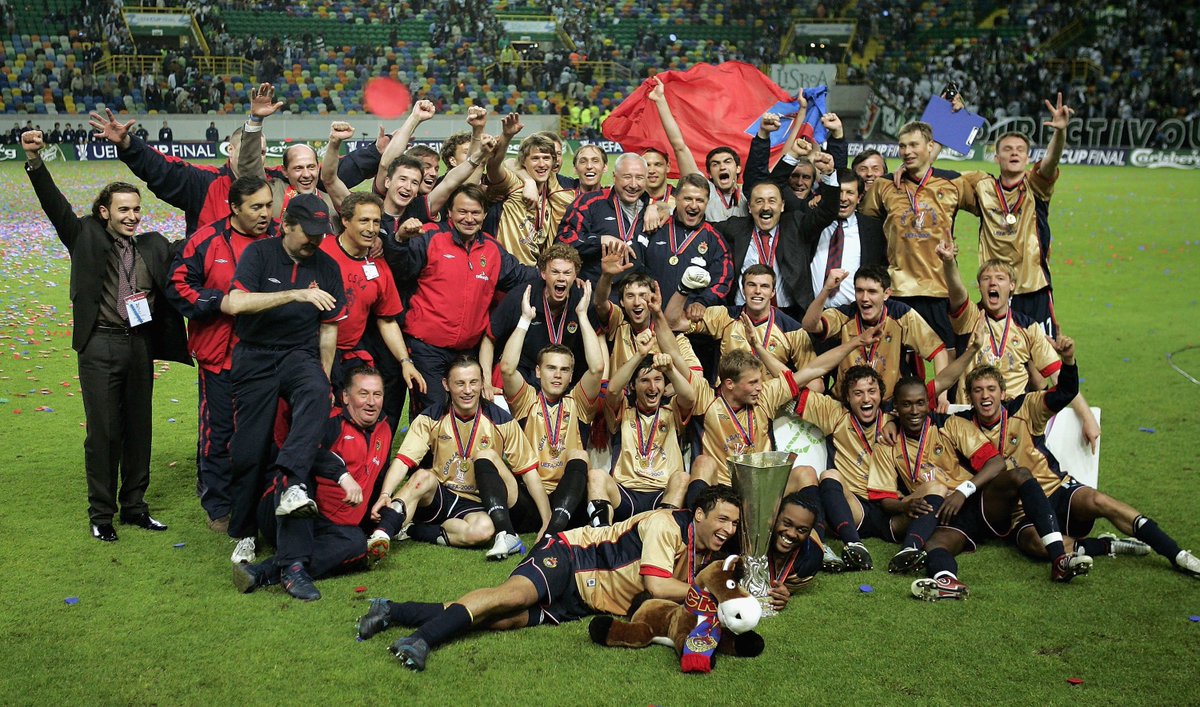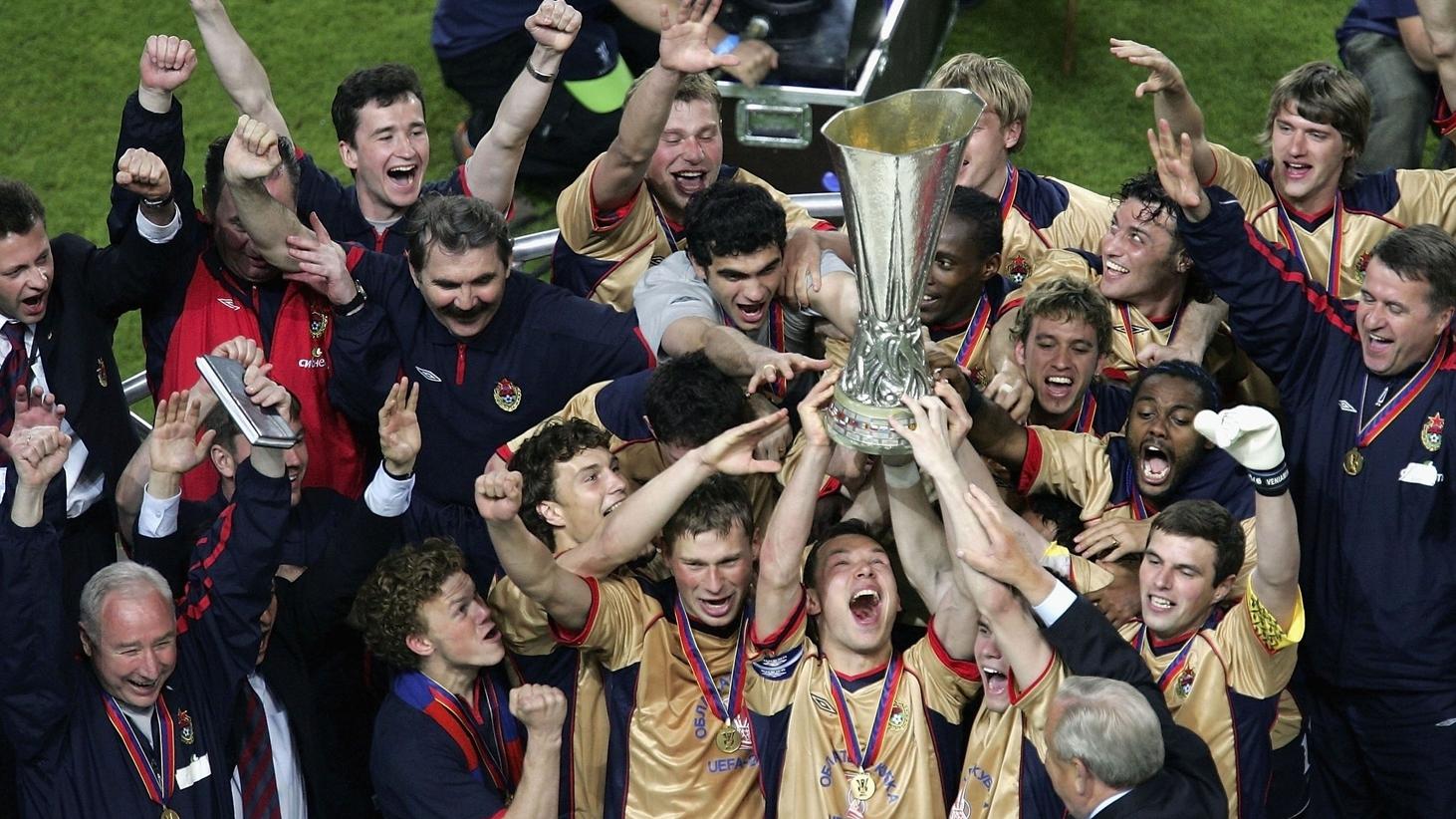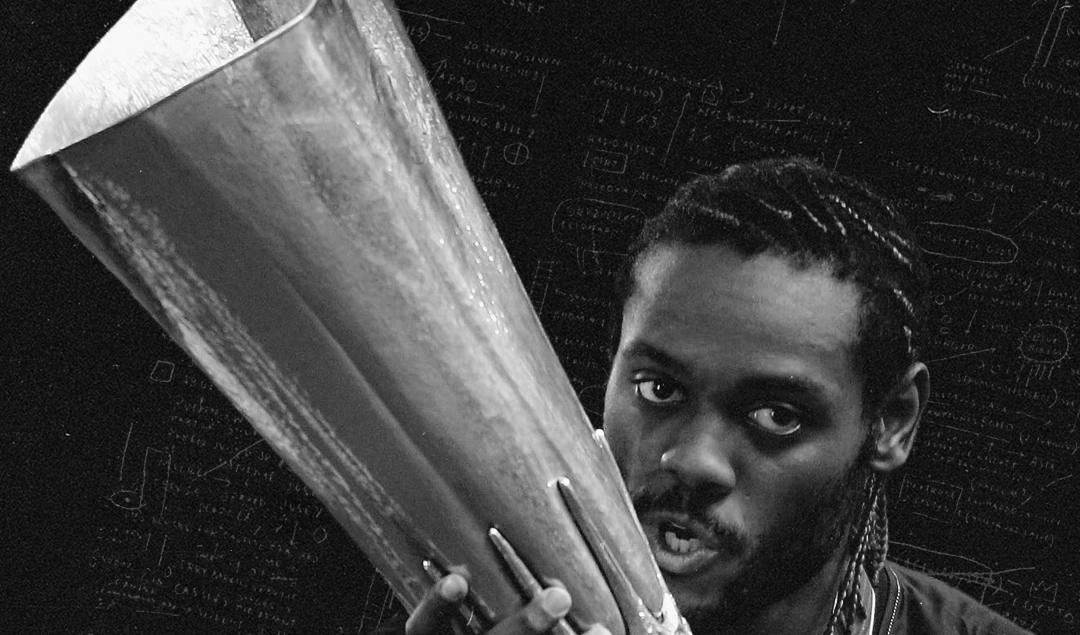Breaking the Ceiling: CSKA Moscow’s 2005 UEFA Cup Win
Russian football has enjoyed several notable moments on the international stage such as winning Euro 1960 and Lev Yashin being awarded the Ballon D’or in 1963. Despite this, Russian clubs in the second half of the 20th Century struggled to progress in European club competitions. However, the 21st Century has led to improving fortunes for Russian clubs, first achieved through CSKA Moscow.
At the turn of the 21st Century, CSKA Moscow found themselves in a tumultuous position. After winning the domestic double in 1991, the next decade resulted in CSKA routinely finishing mid-table in the Russian Top League and enduring an 11-year trophy drought.
2001 was especially a tough year for the club. In a league game against Anzhi in August, goalkeeper Serhiy Perkhun collided with an opposition player, which led to both players losing consciousness. Perkhun’s condition worsened, and he tragically passed away thirteen days later. CSKA Moscow retired the No.16 jersey in the goalkeeper’s honour.

Photo: Denis BGRUS
Further tragedy followed in October when manager Pavel Sadryin, in his third stint at the club, retired in October after being diagnosed with terminal cancer; he succumbed to the disease two months later. However, although 2001 was one of the darkest moments in the club’s history, it also heralded the arrival of Yevgeni Giner as owner in February, who bought the club from the Russian Army.
“His arrival was rather unexpected. He was totally unknown as far as fans were concerned,” explained European football writer Michael Yokhin. “A young businessman, who actually tried to acquire Spartak earlier. Nobody really expected him to succeed. But Giner proved to be a brilliant president. He built a very solid and small management team that made extremely wise decisions and investments. He brought stability, which was even more crucial because of the tragedies of 2001.”
Giner’s wealth led to CSKA making several notable signings – Ivica Olić, Rolan Gusev, the Berezutski twins, Jiří Jarošík, Dimitri Kirichenko — and enjoyed the emergence of a young Igor Akinfeev from the academy. CSKA broke the Russian transfer record twice with the signings of Jarošík and Olić. Coupled with the arrival of Valery Gazzaev as manager after Sadryin’s retirement, the club tasted success by winning the Russian Cup in 2002 and the Russian Premier League in 2003.
Gazzaev would leave in November 2003, but returned in July 2004 when his successor Artur Jorge failed to impress during the 2004 league campaign. However, Gazzaev’s return did not please certain sections of the fanbase, despite steering the club to 2nd in the league and Champions League qualification.
“It was a controversial decision for fans – many didn’t like him due to his powerful style of play during 2002-2003,” explained Vitaly Leonov, a journalist for website Russian Football News. “Also, he had the title of only the ‘domestic coach’.” He was unsuccessful in both international matches (Gazzaev managed the Russian national team from 2002-03) and the UEFA Cup in the 2002-03 season, and was fired shortly after losing to Vardar in the Champions League play-offs.

Photo: Мельников Александр
Nevertheless, CSKA fans’s spirits were boosted in March 2004 when the club signed a three year sponsorship deal worth €41.3 million with Russian oil company Sibneft. In preparation for the Champions League campaign, CSKA made further good use of their riches during the summer by acquiring Miloš Krasić, Yuri Zhirkov and Vágner Love to boost the attack.
However, such investments yielded little results, with CSKA failing to advance past the Champions League group stages by finishing third behind Chelsea and Porto. Consolingly, they progressed to the UEFA Cup knockout stages in their final group game, thanks to veteran midfielder Sergey Semak netting a hat-trick in a 3-1 win at Paris Saint-Germain in early December. Semak would sign for the Parisians a month later.
Competing in the last 32 of the UEFA Cup was something new for CSKA Moscow, and facing Benfica in mid-February posed a conundrum. Up until the 2012-13 season, the Russian league calendar was different to any other leagues in Europe. A normal season in England or Spain lasted from August to May, but Russia’s domestic season was played from March to November. As a result, CSKA prepared for the two legs against Benfica by playing three friendlies, allowing their players to recover match fitness.
Another quirk was the location of the first leg. CSKA did not have a stadium to call home at the time, causing them to play their Champions League home games at Lokomotiv Stadium, owned by rivals Lokomotiv Moscow. Their home league games were mainly played at Dynamo Stadium, home of Dynamo Moscow, as well as the Luzhinki Stadium.
The first leg against Benfica on February 17 was played in Krasnodar, over 700 miles south of Moscow. It certainly benefited CSKA, as they took just 11 minutes to score the opener, Vasili Berezutski tapping in at close range from a free kick. The Russians doubled their lead in the second half when Bosnian midfielder Elvir Rahimić played in Vágner Love who confidently struck the ball past Benfica goalkeeper Quim.
Heading to Lisbon for the second leg a week later without conceding an away goal put CSKA in control of the tie. The second leg ended 1-1, CSKA winning 3-1 on aggregate to progress to the last 16.

Photo: Benfica website
Their next opponents would be Partizan Belgrade, with the first leg held in the Serbian capital on the 10th March. The Russians got the all important away goal through midfielder Evgeni Aldonin after just 11 minutes. However, Partizan were awarded a penalty on 83 minutes, as right back Chidi Odiah was adjudged to have handled the ball while on the ground attempting a tackle. Ivan Tomić thumped the ball into the roof of the net to salvage a draw for the trip to Russia.
The second leg took place a week later in Krasnodar. The first half was a tight affair, as the nerves of a European game meant both sides didn’t want to make a mistake. The game was decided in the second half by CSKA’s Brazilian duo of Daniel Carvalho and Vágner Love. After Partizan Belgrade lost possession deep in CSKA’s half on 68 minutes, the ball was quickly played to Vágner Love near the halfway line.
Two Partizan defenders moved towards the striker yet didn’t notice Daniel Carvalho ahead in support on the left and unmarked. Vágner Love did – quickly playing a through ball to release Carvalho and put himself one on one with goalkeeper Ivica Kralj. Luck was on the Brazilian’s side, as the ball ricocheted off Kraji into Carvalho, shrugging off the covering defender and putting the ball into the back of the net.
It would be CSKA this time who would win a penalty in the 82nd minute with an exact carbon copy of Carvalho’s earlier goal. Another attack from Partizan breaking down, the ball being played to Vágner Love, with a through ball once again releasing Daniel Carvalho. However, Carvalho was scythed down by Nenad Đorđević in the box, causing Italian referee Gianluca Paparesta to award a penalty penalty and expel the Serbian defender from the match. Vágner Love made no mistake from the spot to put CSKA into the last eight.

Photo: CSKA Moscow Website
Progressing to the UEFA Cup quarter finals was unchartered waters for Valery Gazzaev and his players, but it came at the cost to their league form. Having beaten Terek Grozny 3-0 in their league opener, their next two games against Tom Tomsk and Lokomotiv Moscow ended in goalless draws.
Despite their stuttering start to the league season, the Krasno-sinie used those frustrations in the UEFA Cup against Auxerre in the quarter final. The tie was ultimately decided in the first leg at Moscow on April 7. CSKA seized the initiative by taking the lead on 21 minutes through Odiah’s deflected shot.
It would be in the second half where the Russians cut loose, netting a further three goals through a Ignashevich penalty, Vágner Love and Rolan Gusev. Meanwhile, a young Yuri Zhukov showcased his burgeoning talent with two assists. Such a commanding performance meant Auxerre winning the second leg 2-0 in France a week later was nothing more than an inconvenience.
With CSKA in the semi finals, the Russian football authorities acted in making sure their team had the best possible chance of achieving something special for the country After playing Zenit Saint Petersburg in the league just three days after losing to Auxerre, the league postponed their upcoming games to make sure their next league game wouldn’t be until May 22. The only domestic fixtures CSKA played during that period would come in the Russian Cup against Zenit, which they would lose 0-1 before winning the second leg 2-0 in Moscow to progress to the final.
Their schedule now relaxed, CSKA’s semi final opponents were Parma, winners of the UEFA Cup in 1995 and 1999. The first leg took place in Italy on April 28, but it was a game of few chances that ended 0-0. The second leg took place a week later in Moscow at the Lokomotiv Stadium on May 5.
It took just 11 minutes for CSKA’s dominant home record in the UEFA Cup to have an impact. Zhirkov rampaged down the left towards the byline, pulling the ball back to Daniel Carvalho, who lashed the ball ferociously past goalkeeper Luca Bucci. Exultant joy in the stadium unfortunately would spill over, as a flare hit Bucci on the head, which led to play being halted for several minutes and Bucci later being replaced by Sebastian Frey.
The game was decided seven minutes into the second half and once again involved the Brazilian duo of Vágner Love and Carvalho. Receiving the ball just inside Parma’s half, Vágner Love turned past his marker and drove powerfully towards the box. Not for the first time, two defenders moved towards the Brazilian, while Carvalho ran into acres of space on the right. Vagner Love played in his teammate, whose first time shot rifled past Frey to double their lead and set flares alight once more in the stadium.
Photo: CSKA Moscow Website
CSKA made it 3-0 just six minutes later when Vasili Berezutsky headed in Carvalho’s free kick. Another commanding home performance had sealed CSKA Moscow’s place in the UEFA Cup final, as Gazzaev’s men became the second Russian team to reach the final of a European club competition since Dynamo Moscow in the 1972 UEFA Cup Winners Cup. Dynamo lost 3-2 to Rangers in the final, but CSKA were looking to not let history repeat itself.
Their opponents in the final were Sporting, with the final being held in their own stadium at Estádio José Alvalade. At first glance, Sporting were favourites.
“Emotionally it was Sporting obviously,” recollects Vitaly Leonov. “The final was in their city and their home ground. The main squares of Lisbon were full of green seas, in the newspapers and TV the slogans was all the same: Força Sporting! But CSKA had a strong team and Portuguese clubs are traditionally uncomfortable opponents for Russian sides.”
The creativity of Carvalho and goals of Vágner Love played a vital role in reaching the final. But what provided this platform for them to build on was their resolute defence. From the eight games in their run to the UEFA Cup final, they had conceded just four goals and kept five clean sheets. With Akinfeev in goal, the Berezutski twins, Ignashevich and Odiah in defence, CSKA had their own Iron Curtain to cast a shadow upon their opponents.
Finalists Sporting had a talented side under José Peseiro. They had experience in their first-choice goalkeeper Ricardo, centre back Beto and skipper Pedro Barbosa. Furthermore, it was mixed with exciting creativity such as João Moutinho, Fabio Rochemback, Rodrigo Tello and a young Hugo Viana on the bench.

Photo: Wikipedia
Under pressure to claim the UEFA Cup in their own stadium, Sporting began the final in positive fashion and their pressure was rewarded on 29 minutes. Standing outside the 18 yard box, left back Rogério expertly curled a shot into the top corner and left Akinfeev rooted to the spot. Under the cauldron of a majority Sporting crowd, CSKA admirably got back into the game and Vágner Love spurned a golden chance by shooting wide when put through by Olić.
CSKA’s fortunes would change 11 minutes into the second half when Carvalho’s in-swinging free kick was nodded in by Aleskei Berezutski. Unlike his twin brother Vasiliy, it was the only goal Aleskei scored in the UEFA Cup, but undoubtedly the most important. Emboldened by silencing the once fervent Sporting fans, CSKA seized control of the game nine minutes later.
Easily shrugging past his marker inside Sporting’s half, Carvalho pushed forward. Ahead of him were two Sporting defenders, a gap that was slowly expanding between them and Zhirkov running between the hole. Carvalho played the young Russian in on goal, who composed himself by slotting the ball past Ricardo to give CSKA the lead. Unsurprisingly, Sporting surged forward in search of an equaliser, which led to one of the worst misses in the final of a European club competition.
Moutinho’s long range shot was parried away by Akinfeev, but only to Rodrigo Tello on the right. The Chilean’s low cross rocketed across the six yard box only for Rogério to hit the post from two yards out. CSKA’s Brazilian duo punished such a terrible miss, as Carvalho skipped past Sporting’s Joseph Enakarhire on the left, with his cross evading Ricardo and Vágner Love gleefully blasting the ball into the net. Sporting never recovered and CSKA lifted the UEFA Cup – the first Russian side to win a European club competition.

Photo: Getty
“The impact? Absolutely massive. Incredible,” Yokhin explained when asked about the impact of CSKA Moscow’s UEFA Cup win. “Russian fans were not accustomed to success in Europe. In fact, they never won a European trophy before, not even in the Soviet era when Dinamo Kiev and Dinamo Tbilisi were the only winners. In the beginning of the millennium, most of the Russian clubs were suffering from financial problems, and nobody thought they were capable of winning trophies.”
CSKA’s success was widely celebrated, and it might have been one of the reasons behind huge investments by various oligarchs and local governments in Russian football from then on. In December 2005, multinational energy corporation Gazprom took a controlling stake in Zenit.
“Was CSKA’s win one of the reasons behind that? Probably,” said Leonov. “Gazprom and Vladimir Putin both understood that football could do them a lot of good. Zenit won the UEFA Cup 3 years later, as we know.”
“For fans it is the main trophy in the side’s history. Now 15 years later I read the comments in social networks. Many of them write that it was the happiest (or one of the happiest) and most memorable days in their life. Some say that they remember all of that day in detail. For me the best thing is that after the match I saw Eusebio near the stadium. The Portugal legend was in a red and blue scarf and dumbed up to CSKA’s fans.”
The 2005 season would get even better for CSKA Moscow by completing a historic treble – lifting the Russian Cup and winning the league by six points. Yet the success of Russian clubs in European club competitions since 2008 has been elusive. Can a Russian team reach the zeniths of glory first achieved by CSKA Moscow?

Photo: Getty
“At the moment, the situation in the Russian football isn’t good to put it mildly, but the question is rather meaningless to me, because the answer is always positive,” answered Yokhin.
Leonov voiced differing thoughts when asked the same question: “Of course they can. The chances are low, but there is a theoretical possibility of anything. To be honest, Russian sides can’t comply with FFP rules and have strong teams at the same time. Champions League contenders are a narrow circle of big clubs. Zenit, due to the backing of Gazprom, have the resources to win the Europa League. But if Gazprom suffer losses due to the low prices in the oil market, they can’t finance the side at the same level.”
The fortunes of Russian clubs in Europe may not be as strong now, but CSKA Moscow broke through the ceiling to win the UEFA Cup and make the Russian bear roar once again.
By: Yousef Teclab
Photo: @GabFoligno
